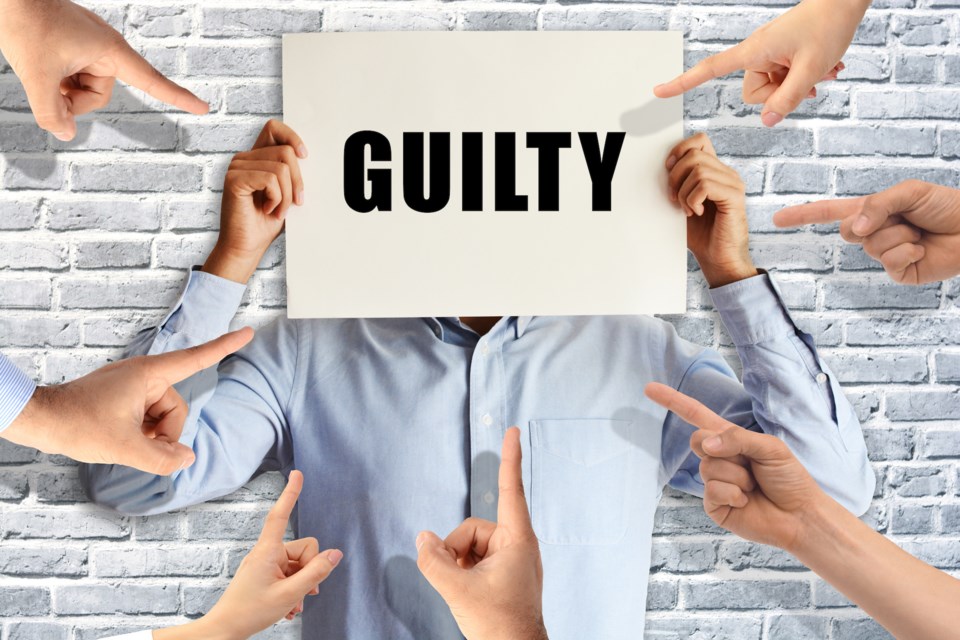An opinion piece in the Canadian Medical Association Journal (CMAJ) is suggesting that public shaming during the coronavirus pandemic might not be the best way to deal with people who break the rules.
The article, authored by Diana Duong, an experienced editor with the CMAJ, examines the idea of naming and shaming those who stand out by ignoring what many now consider to be common sense pandemic precautions.
"People have been quick to call out others for public health failures during the pandemic, especially as those measures have become more politically divisive. But does it do any good?" Duong wrote.
She added that studies have discovered that public put-downs actually result in worse public health outcomes for such things as HIV, obesity and fetal alcohol syndrome.
Duong also wrote that early on in the COVID-19 pandemic some experts warned that shaming could lead to less transparency about people's infection status and information on who they were in contact with. Some people who have tested positive for COVID-19 would rather lie about not wearing masks or not social distancing than endure shaming from their peers.
"However, some physicians argue they have a responsibility to call out people who blatantly defy public health orders and put others’ lives at risk. And some forms of peer pressure may be helpful in achieving public health goals," Duong wrote.
She described the concerns of Dr. Naheed Dosani, who is a Toronto-based palliative care physician. She said Dosani was frustrated to see authorities in Toronto taking several days to shut down the Adamson barbecue restaurant, which refused to comply with local pandemic restrictions. At the same time Dosani noted that authorities were much quicker to police vulnerable communities' adherence to public health rules. Dosani said the level of apparent public support for the restaurant owner felt like a “slap in the face” to frontline workers, Duong wrote. She also posted an anecdote about a woman with a sick spouse who was upset at the restaurant owner.
“I just supported a woman by phone who was in tears because she so badly wants to see her husband in hospital, who has #COVID19,” Dosani posted on Twitter.
“She can’t see her sick husband who really needs her, but a restaurant owner in Etobicoke can defy orders & offer indoor dining?”
Duong said Dosani spoke out about why it was important for physicians to use their position and privilege to challenge the “counter-cultural movement against science and evidence” that has emerged during the pandemic.
"However, since tweeting about the restaurant, he has received insults and death threats from people opposed to public health measures," she revealed.
She added that Dosani was feeling frustrated about "the kind of world we live in now" where death threats were directed at a physician who was standing up "for evidence-based and scientifically supported interventions".
Duong also quoted Dosani as saying the health-care community needs to step up.
“It’s more crucial than ever that healthcare workers, and particularly physicians, stand up and speak out against conspiracy theorists, anti-maskers, and anybody who is creating a movement that moves us away from the pandemic protocol," Dosani said in Duong's article.
She said that Dosani also said there was a difference between calling out those who deliberately defy the rules and shaming those who make mistakes.
The article discussed the case of Dr. Jean Robert Ngola, a physician who was publicly shamed and blamed for a cluster of COVID-19 cases in New Brunswick earlier this year, even though it’s still unclear whether he was patient zero in the outbreak.
Duong revealed how Ngola left his shift at Campbellton Regional Hospital and then traveled from New Brunswick to Quebec to pick up his four-year-old daughter. Believing he was following the rules for essential workers, Ngola did not self isolate on his return.
Ngola later tested positive for COVID-19 and was publicly shamed and outed on social media.
Duong wrote that more than 1,500 physicians across Canada have since signed a letter of solidarity with Ngola, stating that he was judged “prior to due diligence being conducted.”
The article also quotes Steve Joordens, a psychology professor at the University of Toronto who suggested that pandemic rule-breakers might deserve shame, but it does not do anything to bring those people onside.
“What we want to do is convince them to want to do the right thing, so we want to strengthen any tendency they might have to do what we’re all doing and be like us, rather than draw a separation between ‘us’ and ‘them’,” said Joordens in the article.
Duong wrote that Joordens found that people opposed to lockdown measures are typically responding from emotions like fear, rather than rational thought. The point is that public health messages that emphasize the facts over feelings might miss their mark.
She wrote that one recent study found that people were more likely to follow physical distancing guidelines and wear face masks after watching videos of vulnerable people talking about how COVID-19 has affected their daily lives, compared to people who only received information about the benefits of public health measures.
Duong's full article is published in the December issue of the CMAJ.
Len Gillis is a Local Journalism Initiative reporter at Sudbury.com, covering health care in Northern Ontario. The Local Journalism Initiative is funded by the federal government.



